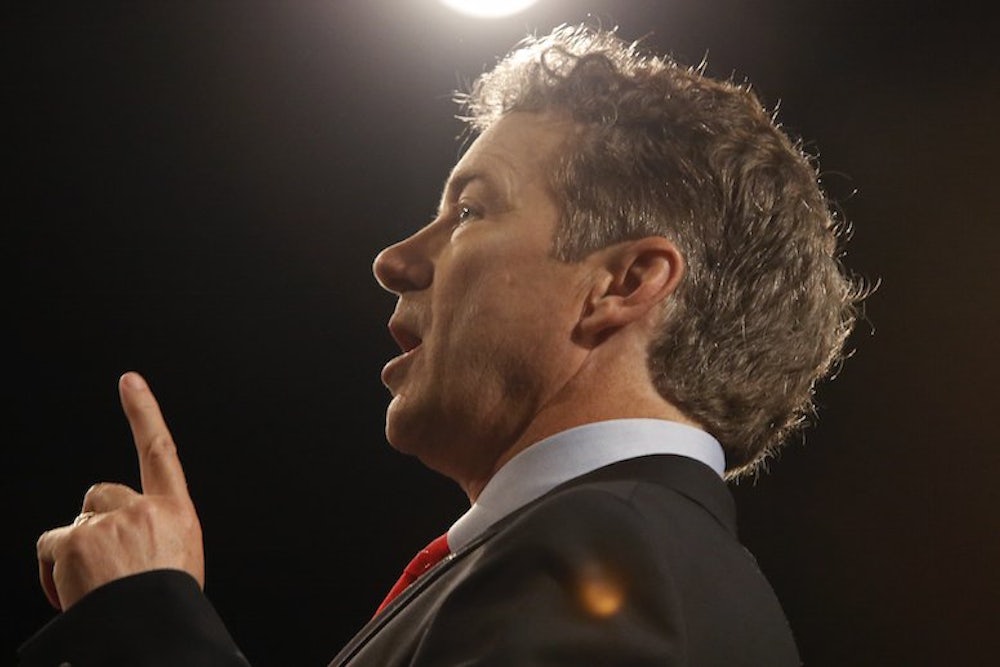You wouldn’t know it based on reputation, but Senator Rand Paul is the most charismatic presidential candidate in the Republican Party. Senator Marco Rubio generates the most buzz in this arena because he doesn’t stumble under questioning; but he's at best only a serviceable public speaker. Senator Ted Cruz can riff, but as one firefighter put it to Bloomberg’s Dave Weigel, his extemporaneous monologues make unconverted audiences feel like they need "to take a shower."
Like Cruz, Paul is every bit the ideologue, but without the cloying infomercial sheen. He’s relaxed and confident, which makes for a very persuasive combination. He's comfortable talking about ideas in public forums without sounding like he’s making canned sales pitches, because he actually built his career around a handful of core beliefs.
But he’s spent the last few years jettisoning those beliefs and sprinkling his record with contradictions, which makes him a bright red target for interviewers, who draw attention to his greatest weakness: extremely thin skin. In the unending contest to channel Ronald Reagan that defines Republican politics, Paul has a decidedly un-Reaganlike tendency to whine and complain and act petulant when challenged by reporters. It will be his undoing.
Less than a day after making his presidential candidacy official, Paul was back on television snapping at an NBC News anchor for daring to preface her questions about his changing foreign policy views with examples of his changing foreign policy views.
"Before we go through a litany of things you say I’ve changed on, why don’t you ask me a question, ‘Have I changed my opinion on it?’ That would be sort of a better way to approach an interview," Paul said, losing his composure. "No no no no no no no no; listen, you’ve editorialized, let me answer a question. You ask a question, ‘Have my views changed?’ instead of editorializing and saying my views have changed. OK, let’s start out with regard to foreign aid."
Paul went on to suggest his old view—that we should not provide foreign aid to Israel—isn’t in contradiction with his new view: that foreign aid should be phased out, starting with antagonistic countries and working back to Israel, because "ultimately all nations should be free of foreign aid because we shouldn't borrow money to do it."
Paul’s new position seems to be that foreign aid is fine so long as the U.S. has a budget surplus. As it happens, one of Paul’s central (and most panderly) presidential ambitions is to advance a constitutional amendment requiring Congress to keep a balanced budget, which would theoretically make foreign aid permissible in Paul’s eyes. One of his other core ambitions, though, is to cut taxes by hundreds of billions of dollars a year. The enormous implied cut in spending would leave little room for any foreign aid.
Perhaps Paul thinks foreign aid is a high priority in the context of a balanced budget. Or perhaps he thinks it should be almost entirely eliminated in order to help balance the budget. Who can really say? It turns out Paul himself once had some thoughts on this matter. One of his first official acts as a senator, way back in January 2011, was to introduce legislation that would have reduced annual discretionary spending by $500 billion immediately, taken almost entirely from the non-defense budget. Included in this proposal were provisions that would’ve reduced State Department spending by 71 percent. These cuts comprised a modest source of savings—just $20.3 billion—in the context of his entire budget. But here’s what he had to say about where the cuts should come from:
Despite billions of dollars spent in attempts to prop up economically weak countries, U.S. foreign aid has had almost an opposite effect. ... Instead of reaching the people who need it, foreign aid has increased the size of the state rather than the welfare of the people. ... Finally, there is no evidence that aiding developing nations produces rapid and widespread economic reforms.
Either Paul believes we should continue to provide foreign aid to Israel (and everywhere else) in a balanced budget environment, or he thinks foreign aid to Israel (and everywhere else) should be eliminated to help keep the budget balanced. His belief that the Constitution should require a balanced budget animates the question of whether he believes we should send foreign aid to Israel outside the question of fiscal constraints. If the answer is yes, then his position has indeed changed.
A less irritable candidate would have been able to dodge the question without getting his back up. Paul is not that candidate, particularly when the person asking it is a woman. He gained notoriety early in his political career after a famously uncomfortable interview with Rachel Maddow—to this day he denies that he suggested on her show that businesses should be allowed to discriminate on the basis of race. More recently he shushed a CNBC anchor questioning the wisdom of his tax policy and his views on childhood vaccinations, telling her to "calm down." This reflex has dogged Paul since he became a political celebrity; his inability or unwillingness to acknowledge (and thus explain) contradictory public statements is almost always the trigger.
That Paul occupies a niche in national politics reinforces the reflex. When he shushes a reporter or scolds her for talking over him, his loyalists don’t see an otherwise talented politician unable to hide his annoyance. They eat it up. In their minds Paul is the rare politician who’ll bite back at reporters when they supposedly expose their biases. But asking questions that other conservatives continue to raise reveals no bias. What it reveals is that, for all his natural talent, Paul can't reconcile his beliefs with his ambitions. That's a huge problem for a national politician. It will define his candidacy.
